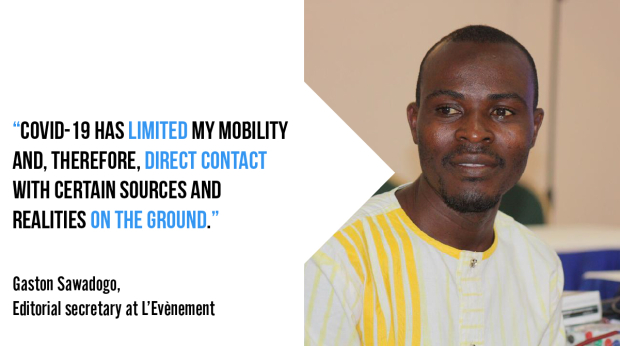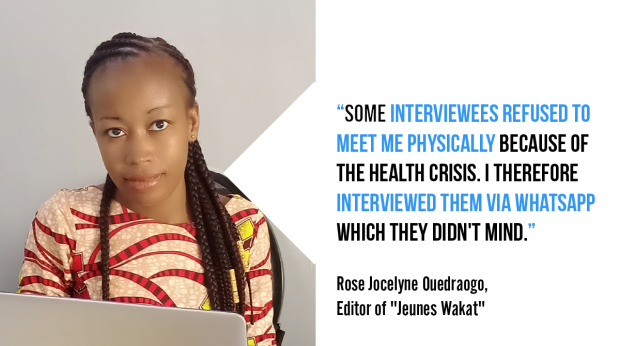This article was written by Ousmane Drabo, awarded Lorenzo Natali journalist, with the support of the Capacity4dev editorial team.
This article is also available in French.
Over a year after its outbreak, the coronavirus pandemic continues to concern the international community. The media have been at the heart of this pandemic – informing their different audiences. Between the risk of exposure to the virus and the impossibility of media coverage on the ground, on top of psychological and economic pressure, professionals have had to use their imagination to find ingenious ways to do their job. These experiences need to be capitalised on, both for now and for the future.
In Burkina Faso and Senegal, journalists played a key role, informing citizens despite the restrictive measures and health risks. While the pandemic continues – with its highly-contagious new variants – the role of the media and journalists is more essential than ever; to continue to keep the public informed, especially throughout the COVID-19 vaccination campaigns.
Media professionals share their experiences and lessons learned to help cover such a health crisis in the future.
The coronavirus crisis has unquestionably disrupted the content production habits and the living and working conditions of journalists. A study conducted by the International Center for Journalists and the Tow Center for Digital Journalism at Columbia University reveals that media professionals have been under enormous psychological, economic and health pressure. The survey, which included 1,400 journalists from 125 countries, shows that 89% reported that their media organisation had taken at least one austerity measure due to COVID-19. These included layoffs, salary cuts, and closures. While the pandemic has certainly had a negative impact on journalists and their work, it has also helped media professionals to rethink and reshape the way they work.
Lessons learnt in terms of media coverage during the health crisis, particularly for journalists in Africa:
- Adaptation. Of the interviews conducted, the word adaptation comes up most frequently. Journalists have to learn to adapt by acquiring equipment, which can be used when contact is impossible, such as boom mikes or having subscriptions/accounts on online video platforms to conduct virtual interviews.
- Multidimensional expertise. Journalism as a cross-cutting profession: The COVID-19 story has shown how useful and necessary it is to have basic knowledge of health and virology. In journalism, it is essential to be educated in various fields (physical sciences, human and animal sciences, social sciences, etc.) to avoid telling dangerous stories when emergency situations like this pandemic occur.
- Capacity to anticipate. During the COVID-19 outbreak, fake news and misinformation1 have proliferated. Most crises occur as a surprise for journalists. In times of crisis, information (true and false) flies in all directions. The journalists interviewed for this article agree that any media professional should make the fight against fake news an essential part of their skill set. It’s a crucial time to sort out the truth from the lies.

In Burkina Faso – like in most West African countries – COVID-19 has had a significant impact on media activity, both in terms of content and production. Burkina recorded its first cases of COVID-19 in March 2020. Caught somewhat off guard, the local media had to adapt to continue informing the public during this crucial period.
Gaston Sawadogo works for the investigative newspaper L'Evènement and serves as its editorial secretary. His staff has been greatly affected by the pandemic; two of them have lost their jobs due to financial issues. For him, his habits have undergone some upheaval because of this pandemic. "On the negative side, COVID-19 has limited my mobility and therefore direct contact with certain sources and realities on the ground. This takes away some of the added value of journalistic work. It has also increased the cost of telephone communication and the use of the Internet, even if this can be compensated for by the lower cost of travel," he confided.
However, for the journalists of l'Evènement, COVID-19 has not been all negative. He adds: "On the positive side, it has made me develop other ways of gathering information, including reporting through open sources such as online data and documentary resources. It has also made me embrace telecommuting and increase my interest in using collaborative tools."
Journalism in lockdown? Not really

Gaston Sawadogo is not alone. Other types of media (especially audio and visual) have not escaped the impact of COVID-19 either. Rose Jocelyne Ouedraogo is a journalist and editor of "Jeunes Wakat", a radio programme set up by CFI's "Medias Sahel" project in the three countries of the Central Sahel (Burkina Faso, Mali and Niger).
"In the field, I personally applied the barrier measures like wearing a nose cover, applying hand sanitiser when touching objects, respecting social distancing," she reassures. Even though the restrictive measures imposed by the local authorities did not prevent Rose Jocelyne Ouedraogo from doing her work as a journalist, she admits that her counterparts are still not inclined to meet her for interviews.
"There were times when interviewees did not find it difficult to meet me for interviews. However, I had one of them refusing to meet me physically, citing the health crisis as the reason. I still conducted the interview via WhatsApp. We also sometimes held meetings and editorial conferences via the same channel," said Rose Jocelyne Ouedraogo.
Basseratou Kindo, a blogger and founder of Mousso News, a website specialising in women's information, said the same thing. She had an intern working for her when the first cases of COVID-19 appeared in Burkina, but she had to terminate her contract to be prepared for any eventuality. Thirteen months after the first case was detected in Burkina Faso, Basseratou Kindo says that teleworking has marked the media sector and many others. According to her, "the work chain has not been completely interrupted. This shows the power of digital technology, which must now be taken into account in communication and information strategies."
Adapting, reinventing ourselves and rethinking our work tools

Souleymane Koanda is a journalist-producer at Studio Yafa, a development radio station based in Ouagadougou. He has been there for three years now, but working through COVID-19 has been an altogether-new experience for him. But he is adapting: "Our newsroom was split in two: one part telecommuting, one part in the newsroom. The editorial conferences were held on a rotating basis," he explains.
In the field, our contact person and his colleagues carefully observed the health measures: cleaning the microphone regularly, positioning the microphone with poles, etc...
To respond to the needs of the population, the radio station Souleymane Koanda works for has established a partnership with the UNHCR, to run the "Let's talk about Coronavirus" programme, aimed at internally displaced persons in the Centre-North of Burkina Faso. The objective was to deconstruct fake news about the pandemic.
From his experience, Souleymane Koanda noted that, above all, the rules governing the profession of journalism had been trampled underfoot.
According to him, content during the pandemic must be focused on human stories. “This type of content speaks a lot to people in a state of anxiety in these uncertain times," he explains.
In every development project, as is the case with Fondation Hirondelle's Studio Yafa, the flow of information must be continuous, as long as human lives exist.
“As Alfred Sauvy said, well-informed people are citizens, badly-informed people become slaves. The managers of these development projects must and can find ways to report even in times of crisis. For example, there is the possibility of working with field-based fixers or journalists specialised in crisis issues of all kinds. To do this, we need to offer specialised training, adequate protection, working equipment and, above all, put the target audience at the heart of our information activities and talk to them in their languages,” he adds.

In Senegal, Abdou Khadim Gueye is a freelance journalist who has worked with The Fact-Checkers, an association financed by the Grand Duchy of Luxembourg to combat fake news around the pandemic. He believes the major lesson to be learned in any crisis period is that editorial offices and any information and communication professional must fight against fake news. "The credibility and the future of our professions are at stake," he advises.
The pandemic has taught some of the journalists interviewed about the need to be more careful about what they say.
Danielle Coulibaly, also a journalist at Studio Yafa, attests "In times of health crisis, the treatment of information becomes more delicate, because it is necessary to know how to choose words, how to use them, which journalistic genres to use, and all that needs to be well prepared."
As a journalist myself and a former winner of the Lorenzo Natali Media Prize (2017), a Media and journalists award of the European Commission, and as media and public information consultant for international organisations, I have been confronted with the harsh conditions of working with the media during the height of the pandemic (between March and July 2020).
At the time, I was a public information officer at the United Nations Information Centre in Dakar. My duty was to cover major UN action for the UN public information platforms (UN Radio, UN News...), but also to handle media relations. At the UN Information Centre, we reported on the great initiatives (young inventors of hand-washing machines, local entrepreneurs producing gel, etc.) that were created during the early stages of the pandemic, a kind of solution journalism. We also worked with journalists in the region on the anti-infodemic campaign, which consisted of deconstructing fake news about the pandemic and vaccines through radio drama, columns, visuals, etc.
What I learnt from this experience is that COVID-19 showed us the importance of media relations in leveraging efforts in the fight against the crisis. In view of the lack of financial means of journalists and the weak structuring of editorial offices (not enough specialised journalists and lack of adequate training), added to their technical difficulties, I also think that journalists need to be (financially and technically) supported so that they can properly fulfil their public missions in critical times like during COVID-19.
Each of the interviewees admitted that access to information sources had become even more difficult than before the pandemic. In the name of content production, inherent to the information profession and the citizen's right to information, journalists are doing their best to ensure their mission. Above all, we all have to learn to live with the pandemic.
Living with the pandemic also means learning to reinvent journalism and public information professions.
The pandemic teaches us that there are ways to continue working properly, provided we take advantage of digital resources (online media coverage devices) and working equipment (camera, microphone...). With the pandemic, the fight against disinformation and the promotion of solution journalism have become more important than ever. They also offer new perspectives to media professionals in these difficult times.
Click on the play button below to watch our video about the role of journalism in Burkina Faso and Senegal during the COVID-19.
|
Ongoing EU-funded projects on media support during COVID-19 in Africa The EU is working to ensure independent and reliable media, and mobilises more than €20 million funding projects to support media professionals and outlets in Africa. Specific emergency measures were put into place to support media hit by COVID-19. On the occasion of Press Freedom Day 2021, some of these initiatives have been presented at the World Press Conference. The European Commissioner for International Partnerships, Jutta Urpilainen made opening remarks at the event. Selected EU-funded projects:
|
Read the other episodes of the voices from the field series:
Credit: Video © Capacity4dev | Photo © Ousmane Drabo
1 Good practices and tips for covering the pandemic and current vaccination operations




Log in with your EU Login account to post or comment on the platform.